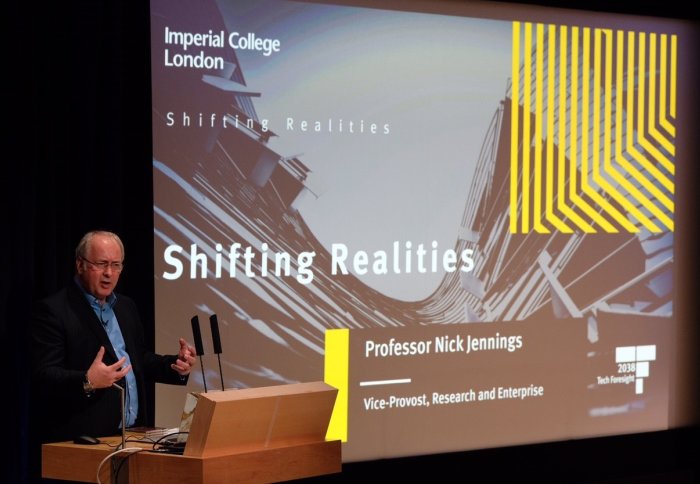In pictures: Technologies of the future revealed

Vice-Provost says technologies and disruptions are about to change how we interact with the world.
At the annual Tech Foresight conference, supported by Imperial Business Partners, researchers discussed how we can adapt to the shifting realities brought on by new technologies and how others are responding to radical technological change.
Professor Nick Jennings CB, Vice-Provost (Research and Enterprise), welcomed guests to 2038, encouraging them to be open to exploring ideas and stating how the conference is “an example of how Imperial makes its research relevant to corporate partners.” He added such events were an opportunity to get the research out of the laboratories and into the real world.
More than 150 scientists, engineers and executives from industry came together to talk about technologies that are likely to hit home in the next 20 years.
Explosion of data
 The audience heard from Professor Mark Girolami, chair in statistics and Director of the Alan Turing Institute, who discussed his work at the intersection of mathematics, statistics and engineering.
The audience heard from Professor Mark Girolami, chair in statistics and Director of the Alan Turing Institute, who discussed his work at the intersection of mathematics, statistics and engineering.
He spoke about the recent explosion of data, but also the challenges of knowing what data to measure, obtain and use. His work looks at identifying and harnessing value in often complex, uncertain and data-rich areas. For example, he and his team work with clinicians to cut down the uncertainty a surgeon faces when performing heart surgery.
He also spoke about creating “digital twins” for physical assets – these are virtual copies of physical structures, which can be used to model what might happen in real life. For example, a digital twin has been created for the world’s first 3D printed steel bridge in Amsterdam, in order to see how the real bridge will respond to people walking on it.

Lasers of the future
 Dr Riccardo Sapienza from the Department of Physics then presented his work on controlling light at the nanoscale. For Dr Sapienza, nanophotonics are the key to advancing technology and he is keen to open up a dialogue between research and industry to show their potential.
Dr Riccardo Sapienza from the Department of Physics then presented his work on controlling light at the nanoscale. For Dr Sapienza, nanophotonics are the key to advancing technology and he is keen to open up a dialogue between research and industry to show their potential.
Dr Sapienza’s group are redesigning lasers which may have future benefits to healthcare, such as sensors in the body which can contribute to personalised medicine, or a sprayable biolaser used during surgery to show the spread of disease. Biosensors could also be used on food packaging to show how close the food is to expiring, Dr Sapienza suggests.
Future dinner plates
Guests then attended interactive workshops with Imperial academics, on topics ranging from the future of data ownership and scientific discovery, to food in 2038 and 4D printing. Dr Isabel Garcia-Perez, Lecturer in Precision and Systems Medicine, and Dr Weston Baxter, a lecturer at the Dyson School of Engineering, discussed what our dinner plates could look like in 2038 as food becomes smarter, more precise and more adapted to our bodies.
Dr Isabel Garcia-Perez, Lecturer in Precision and Systems Medicine, and Dr Weston Baxter, a lecturer at the Dyson School of Engineering, discussed what our dinner plates could look like in 2038 as food becomes smarter, more precise and more adapted to our bodies. Dr Mark Kennedy, of Imperial College Business School, and Professor Mimi Hii, from Imperial’s Department of Chemistry, discussed how AI could revolutionise scientific discovery and what future relationships between AI and humans could look like.
Dr Mark Kennedy, of Imperial College Business School, and Professor Mimi Hii, from Imperial’s Department of Chemistry, discussed how AI could revolutionise scientific discovery and what future relationships between AI and humans could look like.
Dr Connor Myant, a lecturer at the Dyson School of Design Engineering, explored 4D printing and its potential to herald new opportunities for industries and consumers.
Archaeologists of the future
The conference closed with conversation between Professor David Gann, Imperial’s Vice-President (Innovation), and Anab Jain, co-founder and director of Superflux, a foresight, design and technology innovation company. Anab spoke about her work imagining different possible futures, and why this is important, for example looking at the possibilities of civilian drones in cities that patrol the streets.
Anab sees herself and her team as archaeologists of the future, who frequently collaborate with scientists and technologists to take experiments out of the lab and into the streets.
Preparing for tomorrow's technologies
To find out more about all the speakers at this year's Tech Foresight conference, and their research, read the Enterprise team's Shifting Realities feature.
Article text (excluding photos or graphics) © Imperial College London.
Photos and graphics subject to third party copyright used with permission or © Imperial College London.
Reporter
Joanna Wilson
Communications Division